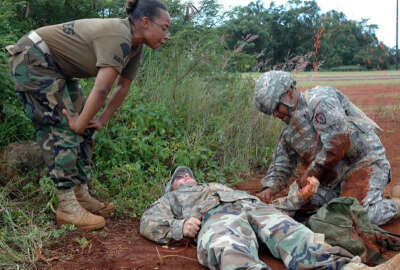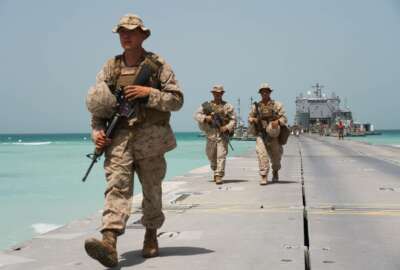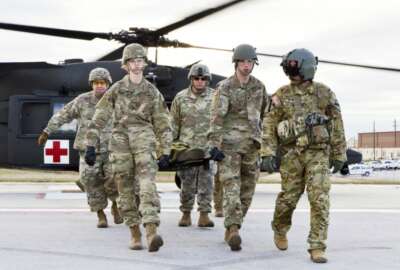
More than 180 military medical students graduate early to help with COVID-19 crisis
The Uniformed Services University of the Health Sciences conferred degrees to more than 180 new medical professionals about six weeks early on Wednesday.
The normal graduation date for the military’s latest class of uniformed health care providers is still about six weeks away. But on Wednesday, the Defense Department’s premiere medical school conferred degrees to nearly 200 new doctors and nurses so that they can begin to help combat the coronavirus pandemic sooner rather than later.
The Uniformed Services University of the Health Sciences granted degrees to 150 M.D. students and 33 advance practice nurses, including clinical nurse specialists, family health, women’s health and mental health nurse practitioners, officials said. Another 26 nurse anesthesia students will graduate on May 1, once they’ve met all of their educational requirements.
For the most part, the new graduates will stay in the national capital region to help with the military’s immediate coronavirus needs there before moving on to residency programs this summer.
Dr. Art Kellerman, the dean of USU’s F. Edward Hébert School of Medicine, said the school’s first-ever “virtual commencement” was possible mainly because of a coincidence of timing.
“At this point in the academic year for most medical schools, including ours, students are finishing up final electives that are nice to have — but not essential to have — to fully complete a medical degree,” Kellerman said in an interview for Federal News Network’s On DoD. “And so as we saw the coming storm of COVID, we thought it was important to lean forward with this class and have them ready in the event that they need to engage to support the mission.”
Kellerman said most of the students will most likely start their formal residencies in early July. In the meantime, Defense medical officials think there are numerous crisis-related tasks they’re already well qualified to perform, should they be needed during DoD’s coronavirus response.
He said that’s largely because USU’s curriculum and internship programs make its graduates, all of whom are commissioned military officers, uniquely-prepared to deal with a situation like a viral pandemic.
Read more: Defense News
“They take the same courses and they have to pass the same tests that every civilian medical school gives. But they also get about 700 hours of additional instruction in tropical medicine, operational medicine, tactical combat casualty care, portable ultrasound, telehealth, and other skills that are vital on the battlefield or when you’re practicing in remote or austere settings, or when you are put in a situation where you don’t have all the facts or all the information,” Kellerman said. “When you have people with that psychological makeup, who have gone through field exercises for multiple days in a row, or have done prolonged field care with some of the top Special Operations docs in the world, and tell them, ‘We’re going to need you to get ready in the next four more days to potentially start assessing COVID patients coming in to Walter Reed,’ they’ll do it. They’ll rise to the occasion. They’ve done it before.”
Now that most of this year’s graduating class is finished with their USU schooling, the university is focused on ways to adapt its curriculum to incorporate more distance learning, in case COVID-19 and social distancing are still factors in the fall semester.
Like many other colleges and universities, Kellerman said USU had already figured out ways to move many of its classes online. But there are parts of medical education that are much more challenging to adapt to a virtual environment.
“How do you do a clinical clerkship in medicine or pediatrics or surgery, when the entire hospital is focused for the moment on COVID? The answer is you really can’t,” he said. “So at the moment, virtually every medical student in America is not in a teaching hospital, doing what they would normally do in surgery or medicine. We hope to be one of the first schools back with the ability to do that as we work through this pandemic, but that hasn’t happened yet. How do you train students in procedural skills that would typically require students working together in very close proximity to each other? That can’t be done either under the current guidance, so we have to find other ways to educate them in those skills. To some degree, we’re inventing this as it goes along, and we’re freely sharing our knowledge and skills with other medical schools. We’ll get through this together.”
Copyright © 2025 Federal News Network. All rights reserved. This website is not intended for users located within the European Economic Area.
Jared Serbu is deputy editor of Federal News Network and reports on the Defense Department’s contracting, legislative, workforce and IT issues.
Follow @jserbuWFED





